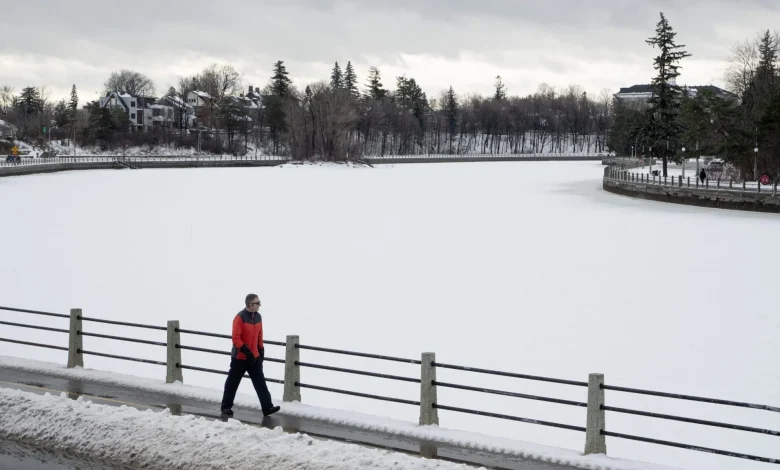A wet winter won’t tamper plans for the Rideau Canal Skateway

Ottawa could see between five and 15 cm of snow on Sunday, marking the first official snowfall of the season. But the white blanket might not stick around for the season.
Typically Ottawa sees its first snowfall in late October. The late start this year could be symbolic of what’s ahead.
According to the Farmer’s Almanac 2025-2026 winter forecast, much of the southern Quebec region, which includes Ottawa, can expect more precipitation this winter, but less snow.
That means Ottawa could be in for a wetter winter, with rain and mixed precipitation cutting snowfall values.
According to Environment Canada, temperatures are expected to be slightly above seasonal, but frigid temperatures are still expected through December and into early January.
Winter weather is becoming more unpredictable across the region, putting a stressor on winter activities like Winterlude and the Rideau Canal Skateway.
But the National Capital Commission (NCC), told CityNews it is proud to maintain the skateway each season and is prepared to tackle the unique conditions of each season.
“Every year, we work diligently under challenging conditions to produce enough high-quality ice that is suitable and safe for mass use,” Maryam El- Akhrass, a spokesperson for the NCC, said in an email statement. “We have been assessing and preparing for the impacts of climate change on our assets and operations for several years.”
Length of the Rideau Canal Skateway’s season from 2014 to 2024. (NCC)
It had been a tough couple of years for the skateway, with it remaining closed for the entirety of the season for the first time in its history in the 2022-2023 season. The following year, the season was short, with only 10 skating days.
The skateway was back in full force in 2024-2025, with 52 skating days, the longest season since 2018. While some of this success can be attributed to the bitter cold temperatures, El- Akhrass said the “outstanding success” is also in part thanks to The NCC’s continued work to prepare for the impacts of climate change and adapt its operations accordingly.
“The past few seasons taught us a great deal about the effects of milder winters on the Skateway, and our partnership with Carleton University is helping us identify strategies to adapt Skateway operations to the impacts of climate change,” she said. “Some strategies have already been implemented, like the use of lighter equipment. The addition of new walking lanes has also allowed an even greater number of people to fully enjoy this uniquely Canadian winter experience.”
The NCC announced a partnership with Carleton University in January 2022 to understand the unique challenges the skateway faces as the climate changes.
Data has been collected on the skateway since 2022 and is expected to be collected until 2026. Over the duration of the partnership, the NCC and the university have rolled out various pilot projects to protect the skateway.
According to the NCC website, early data provides insights into snow management and ice monitoring, as well as identifying problem areas like the water drainage near Laurier Street.
El- Akhrass said there is still promise for upcoming seasons.
“We will continue to explore various approaches in upcoming seasons,” she said. “We are also monitoring weather and water temperatures and using our findings to explore potential adaptation strategies. We are analyzing the data and the results of our pilot projects with Carleton University and remain committed to applying what we learn going forward. ”





